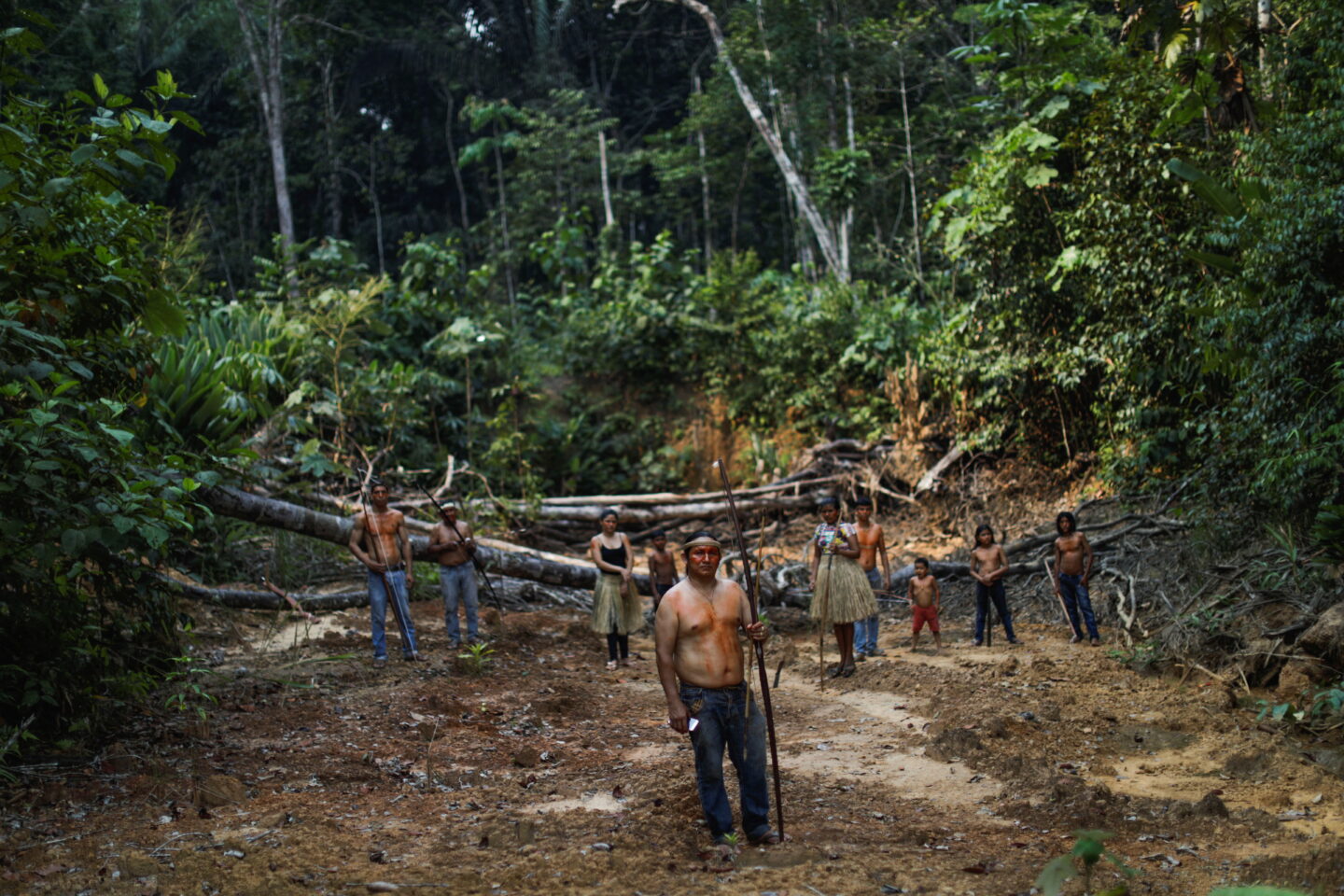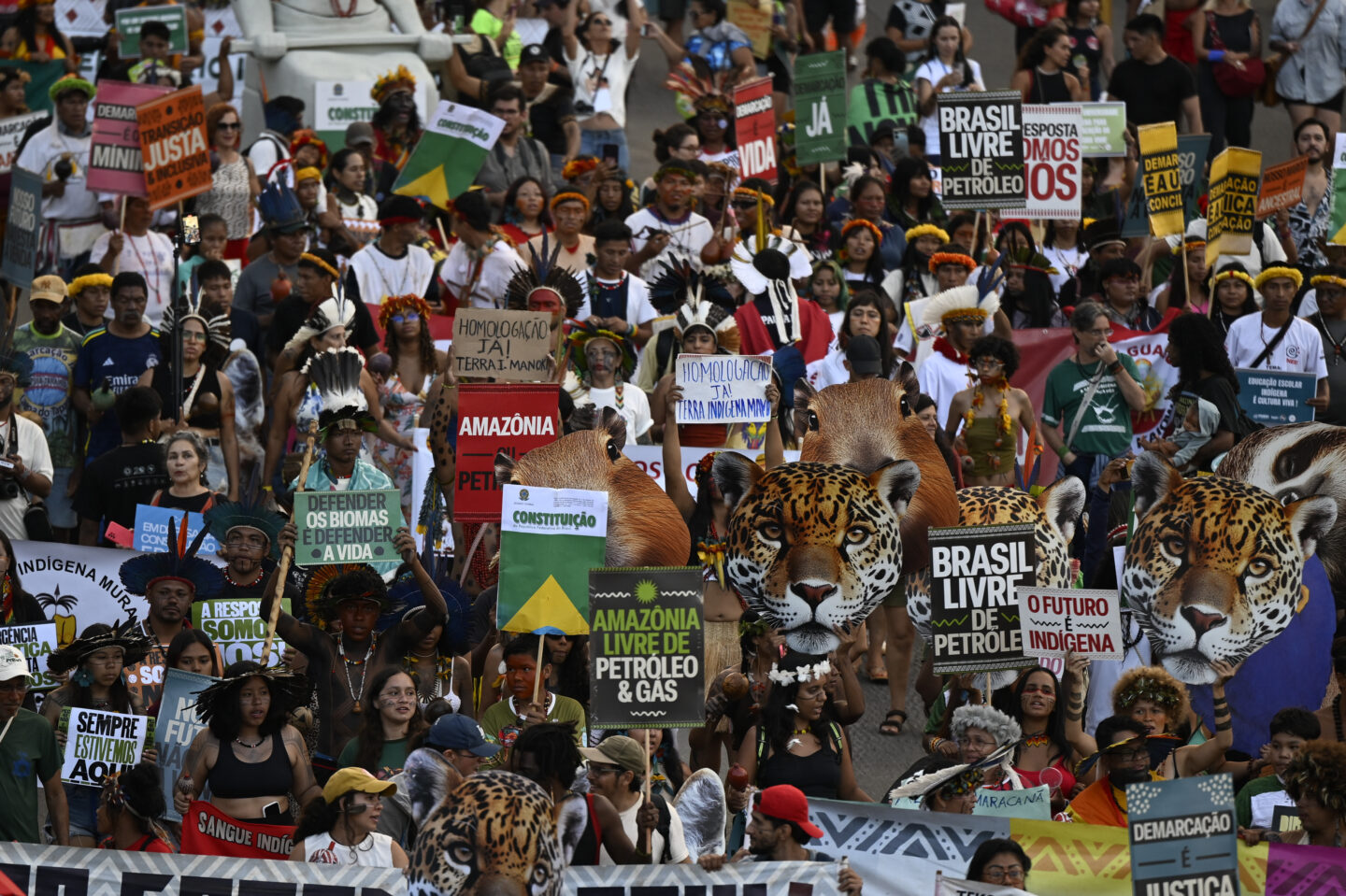Jonas Mura, head of the Mura Indigenous people, says he lost peace when oil and gas companies knocked on his people’s door about a decade ago. For years, he has resisted fossil fuel drilling in Brazil’s Amazonas state, a few hundred kilometres from where COP30 will be held this November.
Lying beneath seven Mura villages located along the Amazon River are more than 10 billion cubic metres of proven gas reserves that have attracted Brazilian power company Eneva. It has secured about $100 million in government funding for the construction of two gas-fired plants there worth $1 billion in total.
“When this company started extracting gas in our territory and I started negotiating for them to stop, they offered me apartments, cars, houses. But my people would remain suffering, so I refused,” Mura told Climate Home in an online interview. “That’s why they wanted to kill me.”
Eneva has said it complied with all legal requirements to develop the gas field, stating that there has been no interference with Indigenous lands and the legal procedure for operating on state land does not require it to carry out consultations.
In 2016, the dispute escalated into violence, and Mura’s house was set on fire. In another instance, his vehicle was shot at. In 2023, the Mura people’s leader was placed under special protection for human rights defenders due to constant threats.
“It can feel hopeless at times. Multinationals have money, weapons, planes, lots of power. Us Indigenous people, we have just a bow and arrow,” he said.
The Amazon basin has emerged in recent years as a new frontier for oil and gas development, holding about 20% of global reserves discovered between 2022 and 2024. Several governments, including COP30 host Brazil, are pushing to extract these largely untapped reserves.
ExxonMobil helps Amazon nation Guyana build ‘petrostate’, while people stay poor
Joining forces ahead of COP30
Despite the odds being stacked against his people, Jonas has expanded his strategy in recent years, from local resistance to entering a new battleground at UN diplomatic summits. Alongside him, dozens of Amazon Indigenous nations based in Brazil, Peru, Colombia, Ecuador and Bolivia have joined forces to demand a ban on oil and gas drilling in the world’s largest rainforest.
The movement launched its first declaration at last year’s COP16 UN biodiversity summit in Colombia, where its members called for an energy transition that “respects life and Mother Earth” as well as an end to oil and gas extraction in the Amazon.
This month, they met again in Peru in a bid to rally forces ahead of the COP30 climate conference, where they want negotiators to deliver a “binding agreement” among all states “on a roadmap/timeline for phasing out fossil fuels”.
After years of resistance in their own countries, the Amazon Indigenous people lacked an international platform to call for a halt of oil and gas permitting in their territories, said Olivia Bisa, leader of the Chapra nation in Peru.
“States are already debating how to phase out fossil fuels. What they are not doing is having conversations with us and listening to our ideas and worries,” Bisa told Climate Home in an interview during the Indigenous assembly in Tarapoto, Peru.
A growing number of Indigenous organisations – many of them demonstrating at last week’s Free Land Indigenous Camp, Brazil’s largest indigenous gathering – are calling for an end to oil and gas extraction in the Amazon ahead of COP30. Observers said the assembly’s initiative can add strength to these calls.
“This campaign can restore the balance of power between governments, companies and Indigenous peoples because it supports and gives more strength to Indigenous demands,” said Carla Cardenas, Latin America Programme Director at the Rights and Resources Initiative, which is not directly backing the Indigenous assembly.
Food systems are the missing ingredient from the COP30 menu
Alex Rafalowicz, global director of the Fossil Fuel Non-Proliferation Treaty Initiative which is supporting the Amazon assembly, said it is different from existing mechanisms for Indigenous participation at climate COPs, as those are limited in scope.
“This initiative is rooted in the struggles and proposals of the Amazonian Indigenous nationalities and peoples who resist extractivism in their territories. It is not an imposed structure nor is it conceived from traditional multilateral frameworks,” he said.
Arrangements such as the UNFCCC’s Facilitative Working Group of the Local Communities and Indigenous Peoples Platform “continue to be consultative and not decision-making”, he added, which prevents “full and binding participation of Indigenous peoples in global climate decision-making”.
If successful, the new Amazon initiative can become a “transformative” precedent, Rafalowicz said, creating “the world’s first fossil fuel-free zone, with a comprehensive remediation approach” for damage that can inspire action in other biodiversity-dense regions like the Congo or Southeast Asia.
Amazon family
As Indigenous leaders from five countries assembled to discuss a fossil fuel phase-out in the Amazon, they have come to feel “like family”, Mura said. Much like him, others have survived violent attacks – and much like him, they haven’t been discouraged from their fight.
For instance, Bisa, the first female leader of the Chapra, has received death threats for over two years. Unknown intruders have tried to break into her home on four occasions and even tried to kidnap her sons. Last year, she was also put under special human rights protection and had to flee her territory. She blames her situation on the oil industry.
“We feel in our skin what they’ve gone through,” Mura said. “We feel what they’re going through now. They have already heard the promises and lies that we are hearing today in our territory. It’s an exchange of experiences.”
The Amazon rainforest emerges as the new global oil frontier
The Chapra have dealt with oil extraction in their territory for much longer than their Brazilian counterparts, as the Northern Peruvian Oil Pipeline (known by the Spanish acronym ONP), owned by state oil company Petroperu, has since 1977 connected their territory to the Bayóvar terminal more than 1,000 km away.
Oil spills in the area are now relatively common. Most recently, in October 2024, a spill of 1,500 gallons devastated fisheries in the Pastaza River. A year before, prosecutors disbanded a gang of businessmen, Petroperu officials and Indigenous leaders accused of purposefully causing oil spills from the ONP so they could charge for the clean-up afterwards through phantom companies.
Fed up with the spills and corruption cases, Indigenous communities have repeatedly targeted oil infrastructure as a way of drawing attention to the problems it causes. Just this week, the Awajun people from the Peruvian Amazon paralysed a section of the ONP, urging the government to provide support for communities affected by spills.

Bisa said other Indigenous nations participating in the Amazon assembly have lived through similar experiences and want to take the fight to COP30 to exert pressure on foreign leaders as well as their own. They have built demands “based on our realities”, she said.
As part of those demands, they want to “nullify oil blocks that have not had the consent of Indigenous people”, “halt investment in new oil infrastructure”, and create phase-out plans for existing oil and gas operations.
The list also requests that governments facilitate access to “energy technologies that do not depend on fossil fuels” as well as “access to climate funds” to strengthen local economies.
“Our fight is unique,” Bisa told Climate Home. “If we don’t resist and fight for our children, who will? We’re protecting life, even that of oil executives and politicians. They also need clean air and water.”
Lula’s government pushes for new oil drilling in the Amazon – where it will host COP30
Oil block auctions “contradictory”
With COP30 landing in November on the banks of the Amazon River, home to about 860,000 Indigenous inhabitants of Brazil, the country’s government has put forward several initiatives to ensure their participation.
Earlier in April, the COP30 presidency announced an International Indigenous Commission to represent Indigenous organisations at international negotiations. Indigenous issues will also feature in one of four “leadership circles” holding debates at COP – alongside circles on climate finance, “global mobilisation” and climate governance – and 30 Brazilian Indigenous diplomats are being trained to participate in the talks.
But leaders at the Assembly for a Fossil Free Amazon were not impressed with these efforts, mostly due to Brazil’s concurrent push to grant oil and gas exploration licenses in the Amazon.
“For us, it’s shameful to have a COP in our country while our authorities are selling several oil and gas exploration blocks, mostly in Amazonas state. It’s a great shame. We could instead be the first country in the world leading the fight against oil and gas,” Indigenous leader Mura said.

“We’re bringing our demands to COP30,” said Valerio Grefa, leader of the Confederation of Indigenous Nationalities of the Ecuadorian Amazon. “Up to now, we have made individual efforts, but we’re now coming together. We will put our demands there with impact. We will only intensify efforts after.”
Their feelings were echoed at the “Free Earth Camp”, Brazil’s largest indigenous march held last week in the country’s capital Brasilia and convening thousands of Indigenous demonstrators. Leaders at the march said the government’s oil block auctions are “contradictory” and called for a halt to oil exploration in the Amazon.
For veteran rights activists like Mura, defending the Amazon basin – which is already perilously close to collapse due to climate change, extreme wildfires and rampant tree-cutting – is not just about protecting the land, but also their people’s history.
“In this forest, my grandfather used to hunt, my father used to hunt, I currently hunt – and my children and grandchildren will continue to hunt,” said Mura. “That’s why we won’t sell our people. That’s why we fight to save our natural wealth.”

